Building nests together

Opal School has a long relationship with Alise Shafer Ivey and Pedagogical Institute of Los Angeles. We’ve admired and contributed to the important work that they’ve led with teachers in Los Angeles and Nest centers serving young refugees in Greece, the Democratic Republic of the Congo, and, now, the US/Mexico border. Here, we offer insights into the volunteer experience of Opal School’s Kathryn Ann Myers.
Pedagogical Institute of Los Angeles is responding to an international crisis by providing the kinds of opportunities to young children that readers of the Opal School Blog believe that all children need – and that their communities depend on. You can support the Nest effort through volunteering at one of their centers or through sending a donation. Learn more about their newest effort on the US/Mexico border at https://www.pilaglobal.org/tijuana-mexico.
After just a week, I am deeply moved by the beauty of this play space and the joy it brings to the children (ages 2-7 years old) and their families.
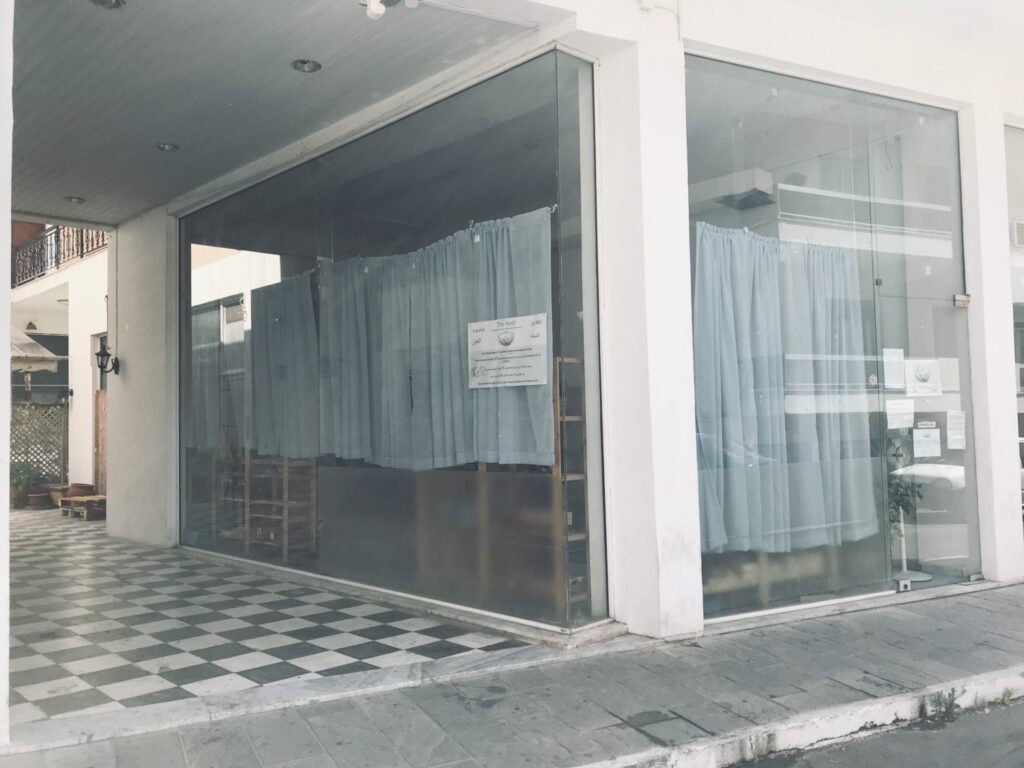
The Nest is located on the Greek island of Samos. As expressed on the Pedagogical Institute’s website, it is “open to Greek citizens as well as refugees, our hope is to bring communities together, and to ease the tensions that understandably exist as newcomers and local citizens share a small, under-resourced island. The Nest is a place where neighbors, regardless of whether they are Greek families living in houses or refugees living in tents, can play together while their parents share a pot of tea. As one Greek mother said as she reflected on a photo of her child playing in the Nest with a refugee volunteer, ‘This is what I want for my child – to know his neighbors, all of them.’ “
There are so many moments I would like to share with you. I am hoping these three simple sketches from my journal, photos of the children’s art, and stories encompasses an overview of the transforming power of this place.
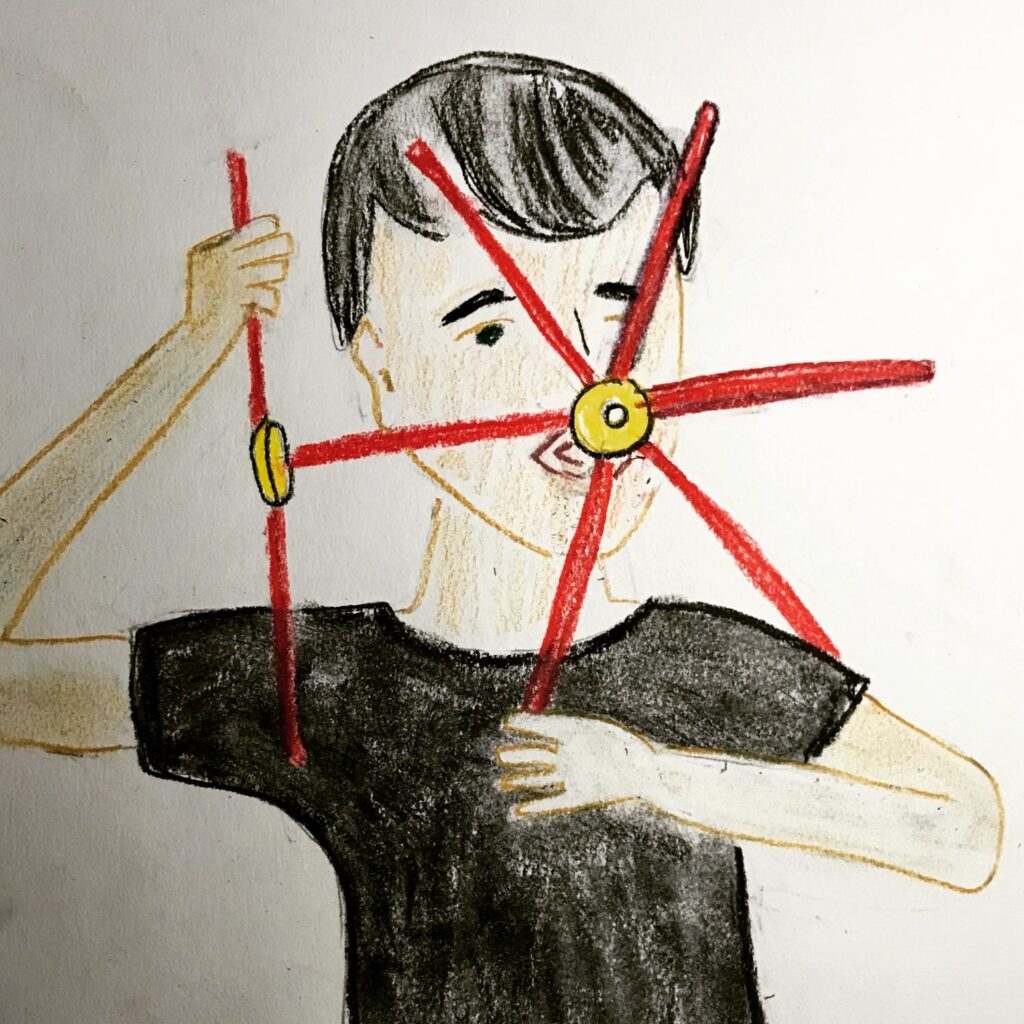
He speaks Farsi.
I speak English.
Today., we both spoke the language of play.
At The Nest, spoken language is not a common denominator. My experience is that spoken language is a natural connector as well as natural divider between an “us” and a “them.” I came to The Nest wondering how I would be able to connect and support these children. I do not speak Farsi, or Arabic, or Greek, or French! Beyond wondering how I would connect with these children across languages, I wondered how these children would connect with each another.
On my first day I learned I had nothing to fear. The children took my hand (literally) and reminded me that I speak the common language of all humanity: Play. They invited me into their world, encouraging me to follow their lead.
I watched as children played together with blocks, sorting the animals into families and helping a lost baby elephant find the other elephants. The children squealed with joy when the baby was reunited with its family. Through watercolor and colored pencils, other children were sharing the special places they had left behind and the boats they traveled on to get to Samos.
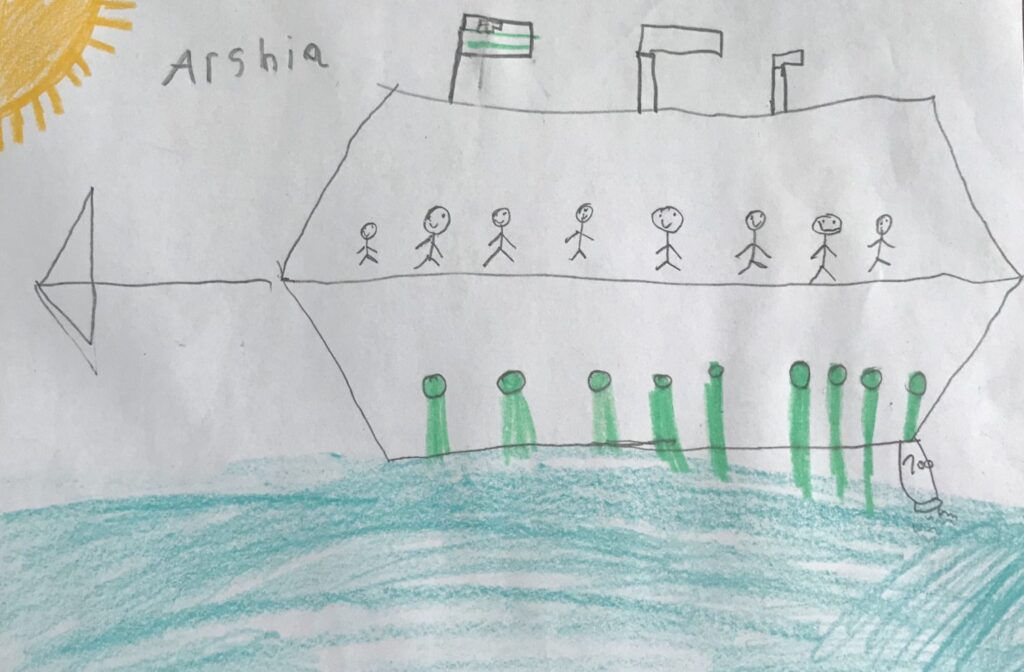
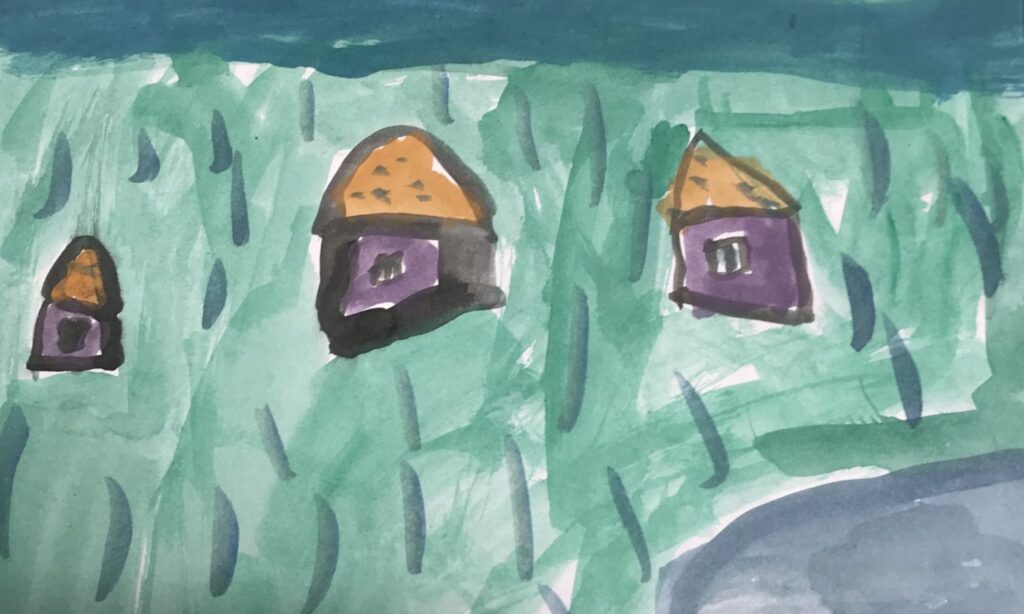
Together, children were problem-solving how to get the ball to roll back and forth to the bottom of the magnet wall by pointing, moving pieces around, smiling, and clapping. It became clear that friendships were forming across barriers and boundaries in this space through the powerful language of play.
At Opal School, we say that Playful Inquiry is an approach to learning alive in a community that courageously and collaboratively relies on the unique gifts of childhood to question what it means to be a citizen world-maker in the midst of uncertainty. Here, in this very different setting, I could see those same lines of Playful Inquiry I’ve come to know at Opal School.
Almost every day, a new family arrives at The Nest with their children. We welcome them with hot tea, fresh socks, and a nametag. My assumption before coming to The Nest was that the parents and children would act like new families at Opal School. This has not been the case.
For many children, this is their first classroom experience. Some stand to the side and watch the other children silently. Others move quickly from place to place dumping out bins of toys, but not stopping long enough to engage more than their cautious counterparts. Others move around the room collecting everything they like into one large pile for themselves, not to play (yet?), but to protect.. Meanwhile, their parents sit on the couch, detached. I wondered why they responded like this to this safe and beautiful space. As I searched for answers I was reminded of 9 year-old Oceanna’s reflection after reading stories about the refugee experience:
The behaviors I am witnessing are communicating that these families are constantly operating in their danger zone. Playful Inquiry supports – and relies on – a state of relaxed alertness. The consistency of having a space like The Nest in their lives creates the possibility of letting down their walls for a moment and relax. The families that have been here for a while feel safe enough to stop watching, moving, and collecting and start to sit down with others to play.
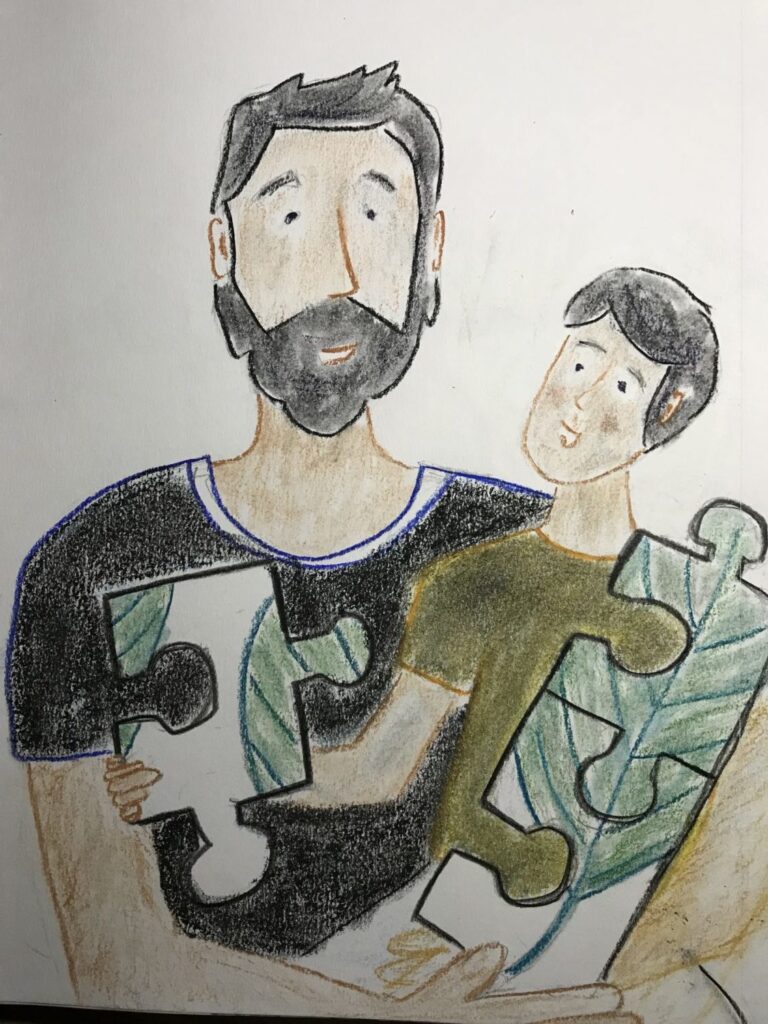
Over the past week I have watched this transformation happen in a child named M. The first day I met him he moved quickly between the spaces leaving a trail of toys behind him.
The next day, I brought him over to the Magna-Tile table. He built for a minute, then used the animals to knock down the structure. Once again, he began moving around the room frantically.
On the third day, he greeted me with “hello,” reached for my hand, and lead me over to the Magna-Tiles. We built homes for animals for over an hour! The fourth day was a repeat of the third.
On the fifth day, we headed over to theMagna-Tiles – but this time, we were not the only ones who had decided to build with these materials. Other children were already at the table building. He yelled, “No!” and started grabbing the tiles out of the other children’s hands and knocked down what they had built. I asked him to give them back the tiles. He ran to the corner and started crying. I wanted to help him brainstorm other strategies for joining their play, but I do not speak Arabic and he only knows a handful of English words.
Then I remembered that we both speak the language of play.
I brought over a stuffed dog and a few Magna-Tiles. I pretended the dog was playing with the tiles. Next, I looked at the dog, put my hand out and said “please” and pointed to the tiles. The dog gave me a tile. I acted it out again. M watched, then yelled “No. Go away!” I respected his request and walked away.
Saturday and Sunday passed. On Monday, M arrived at his usual time. “Hello” he said, then held my hand and we walked over to the Magna-Tiles. The two of us started to pull tiles out of the basket onto the table. I decided to take a big pile of tiles for myself to see what he would do. He grabbed for them like he had done with the other children the day before. I said “no” and stopped him. Next, I put my hand out and said, “Please.” He put his hand out and pointed at the tiles. I gave him one. He smiled. Again he put his hand out and pointed. Again I gave him one. K came over and started building a tower. K does not speak Arabic. M wanted one of K’s tiles. He put his hand out and said, “Please.” K smiled and gave him one. M added it to the top of the tower K was building. K gave him another one. Then, to my surprise, M said “for you” -and gave K one of the tiles from his pile.
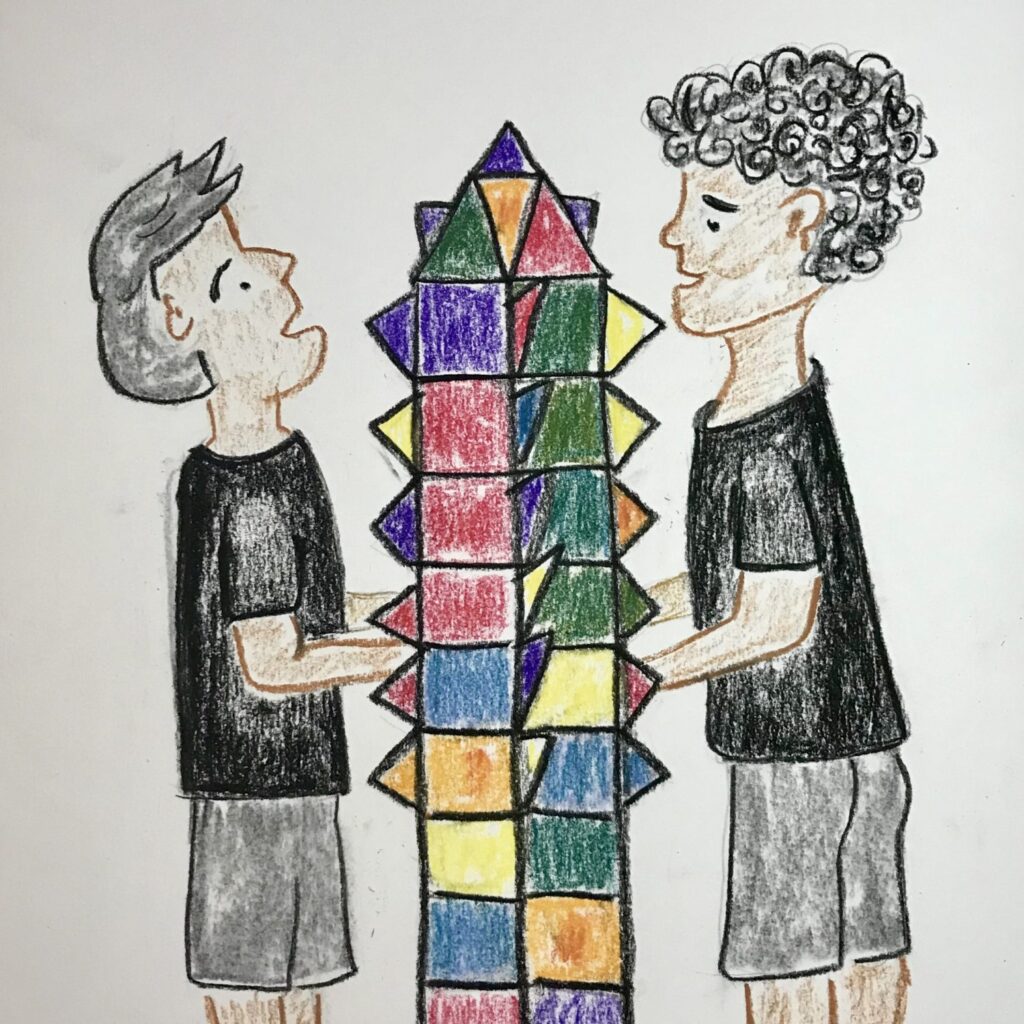
We need more “nests” in the world. We must intentionally slow down our fast paced lives to take the time and give the loving attention needed for people to move out of danger zones and into relaxed alertness to reinvent our worlds together in ways we have yet to imagine.
It’s easy to feel helpless as we read heartbreaking stories daily. Each of us can take meaningful action through contributing to these nests.. Learn more about all The Nests – including the newest one on the US/Mexico border at https://www.pilaglobal.org/tijuana-mexico.

Opal School is hosting a webinar for people interested in learning more about The Nest. Join Kathryn Ann, Alise Shafer Ivey, and Susan Harris MacKay, Wednesday, September 18, 5:00-5:45 pm Pacific Time.
To receive log-in information, register at https://forms.gle/pXZFMs9DGVm1wviT8